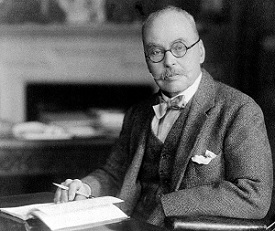Apr 13, 2025
Apr 13, 2025
 Sir Ronald Ross (1857-1932) was a British medical doctor who received the Nobel Prize for Physiology or Medicine in 1902 for his work on the transmission of malaria. He was the first Nobel laureate, and the first to be born outside Europe. His discovery of the malarial parasite in the gastrointestinal tract of the mosquito in 1897 proved that malaria was transmitted by mosquitoes. This resulted in the development of a method for treating the disease. Ross worked in the Indian Medical Service for 25 years, and during this time he made the said medical discovery. After resigning from his service in India he joined the Liverpool School of Tropical Medicine and continued as Professor & Chairman for 10 years.
Sir Ronald Ross (1857-1932) was a British medical doctor who received the Nobel Prize for Physiology or Medicine in 1902 for his work on the transmission of malaria. He was the first Nobel laureate, and the first to be born outside Europe. His discovery of the malarial parasite in the gastrointestinal tract of the mosquito in 1897 proved that malaria was transmitted by mosquitoes. This resulted in the development of a method for treating the disease. Ross worked in the Indian Medical Service for 25 years, and during this time he made the said medical discovery. After resigning from his service in India he joined the Liverpool School of Tropical Medicine and continued as Professor & Chairman for 10 years.
Sir Ronald Ross was born in Almora, India. At the age of 8 years he was sent to England to live with his aunt and uncle on the Isle of Wight. He joined the St. Bartholomew's Hospital Medical College , London in 1874. In 1889 he took a course in bacteriology under Prof. E.E. Klein. Between 1881 and 1894 he was variously posted in Madras, Burma, Baluchistan, Andaman Islands, and Secunderabad. In 1894 he went to London, and met Sir Patrick Manson for the first time. Manson introduced Ross to the problem of malaria research. Manson believed that India was the best place for study on malaria. Thus Ross returned to India in 1895 and landed in Sucunderabad. From there he went straight to Bombay Civil Hospital and started making blood film studies. In May 1984 Ross observed the early stages of the malarial parasite in the stomach of the mosquito. The Ronald Ross Memorial, Calcutta marks the great work done by Ross in India.
Malaria is a parasitic disease caused by the protozoan Plasmodium. The continued prevalence of malaria needs an attack on the malarial parasite, and on the vector (carrier) the female Anopheles mosquito. Thus Ross was able to prove eventually the mosquito was the carrier of the malarial parasite. This wonderful discovery has saved thousands of liver in tropical countries. The first antimalarial to be discovered was quinine obtained from the bark of the Cinchona tree. Later, a number of drugs were discovered to control malaria in man, in addition to the control of the vector. Further detail is out-of-scope of this article.
Reference:
"Wonders of the Past and Present' by C.A. Parkhurst , Macmillan Company, 1943)
14-Dec-2019
More by : Dr. Frank S. K. Barar